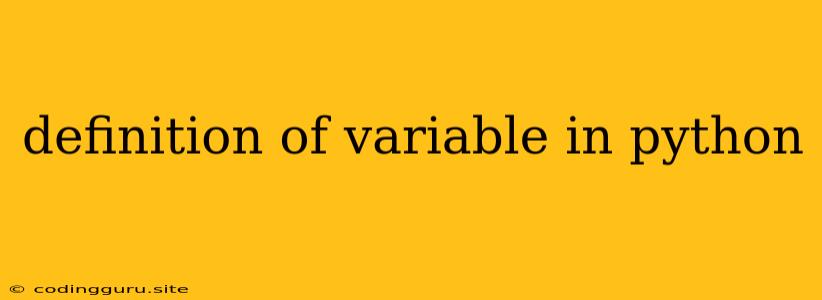What are Variables in Python?
In the realm of programming, variables are like containers that hold information. Imagine them as labeled boxes where you can store different types of data, like numbers, words, or even lists of things. Python, known for its readability and ease of use, makes working with variables a breeze.
Why are variables important?
Variables allow you to work with data dynamically. Instead of writing the same value repeatedly in your code, you can store it once in a variable and use it whenever needed. This makes your programs more efficient and easier to manage.
Understanding the basics
Let's break down the concept with a simple analogy. Think of a variable as a name tag. You attach a name tag to an object, and from that point on, you can refer to the object by its name. In Python, you "attach" the name tag using the assignment operator (=).
A simple Python example
# Assigning a value to a variable named 'age'
age = 25
# Printing the value of the variable 'age'
print(age) # Output: 25
In this example, we created a variable named "age" and assigned it the value 25. Now, whenever we use the variable "age" in our program, Python will understand it as representing the number 25.
Types of Data in Python
Python supports various types of data, each with its own characteristics:
- Integers (int): Whole numbers like 10, -5, or 0
- Floats (float): Numbers with decimal points like 3.14, -2.5, or 0.0
- Strings (str): Text enclosed in single or double quotes like "Hello", "Python", or "123"
- Booleans (bool): True or False values
Assigning Values to Variables
When you create a variable in Python, you're essentially telling the computer to reserve a memory location for storing data. The assignment operator (=) is used to assign a value to a variable. Here's how it works:
name = "Alice" # Assigning a string to the variable 'name'
price = 10.99 # Assigning a float to the variable 'price'
is_active = True # Assigning a boolean value to the variable 'is_active'
Variable Naming Conventions
To make your Python code more readable and understandable, follow these naming conventions:
- Start with a letter or an underscore (_): Variable names cannot start with numbers.
- Use only letters, numbers, and underscores: Avoid using special characters or spaces.
- Be descriptive and meaningful: Choose names that clearly indicate the purpose of the variable.
- Use lowercase letters: Conventionally, variable names are written in lowercase.
- Separate words with underscores: For longer variable names, separate words with underscores (e.g., "user_name").
Best Practices for Using Variables
- Use meaningful names: Choose names that clearly communicate the purpose of the variable.
- Avoid using reserved keywords: Python has a set of reserved words that cannot be used as variable names (e.g., "if", "else", "for", "while").
- Be consistent with naming conventions: Stick to a consistent naming style throughout your code.
Example:
Let's illustrate how variables work in a real-world scenario. Imagine you are building a simple online store application in Python. You might have variables like:
product_name = "T-Shirt"
product_price = 19.99
quantity_in_stock = 100
These variables store information about a specific product, making it easier to manage and manipulate data within your program.
Understanding Variables in Python
Variables are the fundamental building blocks of any programming language. They enable you to store and manipulate data, making your programs dynamic and efficient. By understanding how variables work in Python, you take a crucial step towards mastering the language and building powerful applications.
